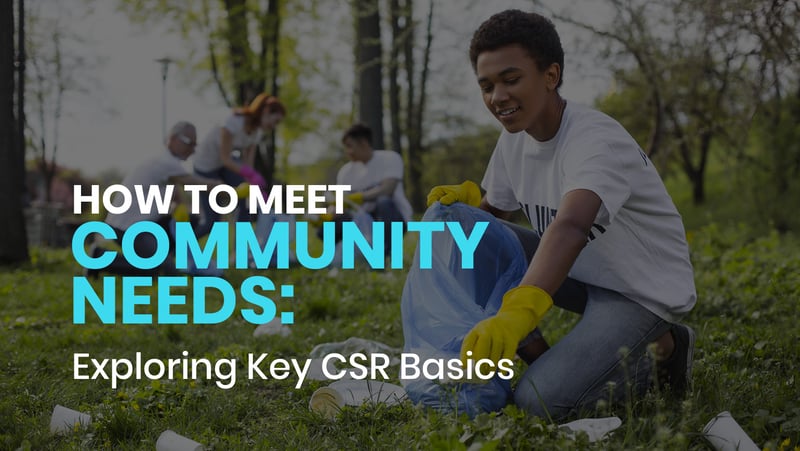According to recent surveys, nearly 75% of Americans believe that it's essential for companies to make the world a better place. But how can businesses make this worthy aim a reality?
By implementing thoughtful corporate social responsibility (CSR) programs! These programs include various initiatives demonstrating a company’s attitude and efforts toward improving society. In other words, they convey how your organization is responsible for contributing to social good.
In this short guide, we’ll discuss why CSR matters and the potential ways your organization can positively impact your workplace, local, and global communities.
Why Does CSR Matter?
Ultimately, CSR is essential because it drives positive social change that goes beyond the economic benefits of profit.
However, it's important to consider the public aspect of CSR. Consumers and other organizations are more likely to support small businesses that prioritize helping others. As a result, your positive brand image can expand your network of customers and peer organizations.
CSR also has the ability to:
- Strengthen work culture: Employees want to work for socially responsible organizations that practice what they preach. Additionally, employees feel that their work has more meaning when their employer actively provides opportunities for the business to give back. This positive experience can, in turn, increase employee motivation and decrease turnover.
- Increase customer loyalty: CSR programs can win customer loyalty as more people commit to socially conscious choices. For example, many consumers are willing to adjust their buying habits to decrease negative environmental impacts such as climate change.
- Create a lasting community impact: Effective CSR can connect a business with its community. Your company’s CSR programs, such as employee volunteer grants or support of local entrepreneurs, can open the door to meaningful collaboration and partnerships.
It can be helpful to structure your CSR program to meet the needs of your workplace, local, and global communities. You have the most influence over your workplace policies and need to make sure those are in line before moving on to serving local and international communities. That said, let’s explore each of these communities in more detail.
Workplace Community
How a company treats its employees speaks volumes about its values. It shows that you’re making the world a better place by simply providing a positive, productive workplace environment. Therefore, you should evaluate your workplace needs and research actionable CSR strategies to meet them.
For reference, eCardWidget suggests trying these strategies to improve company culture:
- Hosting company events: Connect with your employees by offering after-work or weekend events for employees to foster lasting relationships. These events should align with your company’s preferences and can range from organizing a weekend running club to attending a local festival together.
- Providing feedback opportunities: Encourage your employees regularly so they can correctly assess their performance. Be uplifting in your reviews when possible, and give them opportunities to share how they feel about their positions to create an open and positive workplace culture.
- Starting an employee recognition program: Engage your employees by rewarding them for exceptional performance. Bonuses, raises, and promotions are usually the most appreciated form of recognition. You can also offer perks like hybrid workdays, free meals, and time off as another thank-you for their hard work.
In addition to fostering an upbeat work environment, meeting workplace needs can significantly impact your company’s growth. That includes increased productivity, employee retention, and employee acquisition.
Local Community
Once you’ve settled your business’ workplace CSR programs, begin looking for ways to collaborate with existing nonprofits and charities in your local community. Finding programs near you that already specialize in meeting local needs can be rewarding. This type of CSR outreach might look like this:
- Volunteering at a local animal shelter.
- Providing in-kind donations such as canned food products or blankets for your local homeless shelter.
- Hosting an environmental clean-up for your nearest coastline or busiest city street.
- Contributing to local infrastructure or development projects to improve public spaces.
- Offering discounted lessons or mentorship opportunities to local youth.
Because each local community is unique, choosing CSR efforts that meet city-specific needs and align with your company values is best. For instance, if one of your dance studio’s values is to promote self-care, you might engage in CSR programs related to mental health or community wellness outreach.
Global Community
By making thoughtful and strategic decisions, organizations can use CSR to extend their reach to global communities. It’s vital for organizations to adequately assess their resources and capabilities to make a meaningful contribution.
Consider broader issues like environmental stewardship and advocacy to help your organization pinpoint how to use its resources to meet global needs. Keep in mind that you don’t need to enact a major change or make a large donation to make a lasting difference. For inspiration, check out this roundup of easy ideas to improve the environment:
- Recycle everyday items: Educate your employees about recycling items like paper, electronics, and glass containers. You could even host a competition to see which team can recycle the most clothes or running sneakers.
- Reduce energy consumption: Implement energy-efficient practices such as turning off lights and electronics when not in use. Additionally, encourage reusable items like water bottles or lunch containers to minimize waste.
- Partner environmentally conscious organizations: Look for partners that go the extra mile for the environment. It could mean you decide to work with a sustainably sourced merchandise retailer to grow your additional revenue.
Research other environmentally friendly fundraising providers. For instance, you might look into organizations like Sneakers4Good to give away your shoes that get shipped to developing countries and receive a check to give to local charities. That way, you can kill two birds with one stone—help the environment, and donate to a nonprofit.
To make CSR easy, ask “What can I do right now to make my immediate community better?” For small businesses, that means improving the lives of your employees first. Then, you can tap into your local community, find actionable ways to meet its needs, and practice thoughtful global CSR. To keep your approach aligned with ongoing issues and updates, continually research any new social or environmental conditions and be on the lookout for small ways your organization can help.





.png?width=596&name=Double%20the%20Donation_DanceStudio-Pro_What%20CSR%20program%20is%20Right%20for%20My%20Business%20%207%20Ideas_feature%20(1).png)
